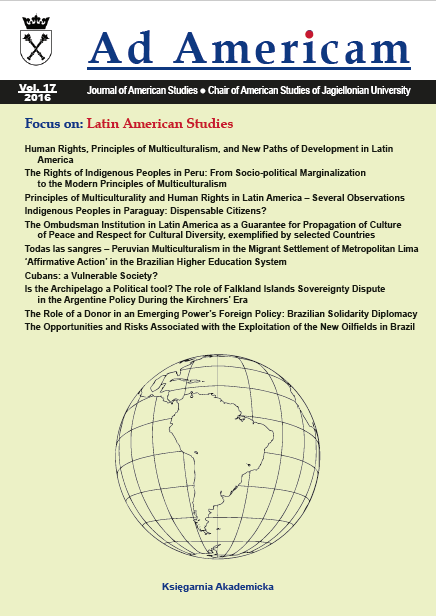The Rights of Indigenous Peoples in Peru: From Socio-political Marginalization to the Modern Principles of Multiculturalism
The Rights of Indigenous Peoples in Peru: From Socio-political Marginalization to the Modern Principles of Multiculturalism
Author(s): Marta M. KaniaSubject(s): Politics, Ethnic Minorities Studies
Published by: KSIĘGARNIA AKADEMICKA Sp. z o.o.
Keywords: indigenous peoples; Peru; multicultural politics; Comunidad Nativa Tres Islas
Summary/Abstract: The purpose of this article is to give a brief overview of the evolution of the socio-political and legal status of indigenous peoples in the Republic of Peru, and to present one particular example of the struggle for respect and implementation of their rights, as enshrined in international documents and the Constitution of Peru (1993). In the article the historical and problematic perspective has been assumed, discussing the problem from Colonial times, when important decisions were made by the Spanish administration regarding legal and political aspects of indigenous peoples’ status. Next it is discussed the Republican period, which was characterized by a policy of integration and forced acculturation of indigenous peoples into Creole-mestizo mainstream of society. Then the article focuses on the 20th century and the first attempts to acknowledge the diversity and cultural and ethnic identity of the indigenous population, albeit as part of a paternalistic indigenism movement. Finally, it examines the recent decades, which saw the introduction of multicultural policy principles in the form of particular amendments to the Constitution and ratification of major international documents relating to the rights of indigenous peoples. This last period is characterized by a new model of relations between the state and indigenous, and represents an official effort to move away from discriminatory and marginalizing attitudes towards the Indian community, although implementation of multicultural principles is still a very difficult process due to the ossified and inflexible system of dependency and indolence at the level of local administration. The article concludes with a case study of Comunidad Nativa Tres Islas (Madre de Dios), one of the native communities which has for years been fighting for the implementation of a favorable decision of the Constitutional Court of Peru, which at the regional level is still not respected.
Journal: Ad Americam. Journal of American Studies
- Issue Year: 2016
- Issue No: 17
- Page Range: 11-32
- Page Count: 22
- Language: English

